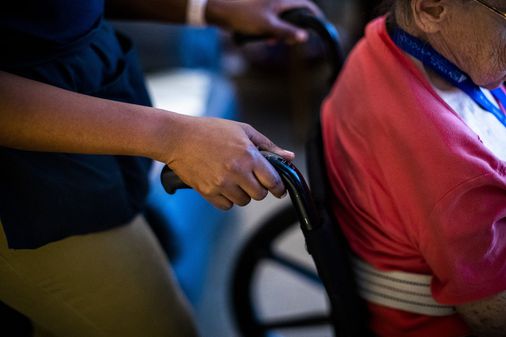The rate increases come after nearly a month of public comments were submitted to the office a review by the Rhode Island Attorney General’s office. Each year, the Attorney General Peter F. Neronha’s office hires independent actuaries to evaluate health insurance companies’ proposed increases.
In June, Tigue said the proposed rate increases demonstrated the “continued need for shared accountability by insurers and providers to address the underlying costs of health care in order to promote affordability for Rhode Island consumers and businesses.”
During a public comment period, Rhode Islanders expressed outrage over the increases.
“I’ve just about had it with rate increases from [Blue Cross Blue Shield,” wrote Mark De Binder in an email to OHIC. He said his and his wife’s plan has gone from $800 to $2,400 per month since 2012. “And we don’t have any un-normal health situations.”
Clay Moore, a sales and business development manager, said all Rhode Islanders are facing “excessive increases” in gas prices, rent, property taxes, groceries, and utility bills, and it is “unconscionable to raise” rates.
Neronha told the Globe in a statement Wednesday that there appears to be a “presumption” by most insurers that their rates must go up every year, regardless of prevailing economic and other conditions.
“If healthcare costs are rising, it is the public alone who must bear the full weight of those rising costs,” said Neronha in his statement. “And it is a clever game that these insurers play. They typically ask for the moon, recognizing that they are likely to get less, yet secure in the knowledge that the lesser amount they are virtually guaranteed to receive will nevertheless be an enormous win.”
Blue Cross Blue Shield of Rhode Island and Neighborhood Health Plan of Rhode Island requested plans to be sold on the individual market for people who do not receive insurance through their employer. Blue Cross Blue Shield requested a 9.6 percent rate increase, but was approved for a 3.1 percent rate increase into the next year. Neighborhood requested a 6.8 percent increase, but after the Attorney General’s office recommended a 9.8 percent increase, Tigue approved a 8.2 percent increase — which will impact the more than 25,000 people enrolled in the plan.
Brian Hodge, a spokesman in the Attorney General’s office, said Neronha urged Tigue to “deny all requested increases, except for Neighborhood’s in the individual market.”
“This year, like last year and the year before, we advocated that OHIC use its discretion to deny the requested premium increases. We did this, despite our own retained actuaries’ analysis, because I believe they are nevertheless not justified given current, overall economic conditions,” said Neronha in his statement to the Globe. “The only exception was a single instance where, based on our actuaries’ opinion, an increase to Neighborhood’s rates in the individual market was necessary to ensure the company’s solvency and thereby maintain consumer choice in that market.
Last year, Tigue approved a 3.5 percent rate increase for Neighborhoods individual market plans.
“My office has conducted a thorough review of the rate filings, public input, and considered the actuarial recommendations provided by the [Attorney General’s office] across all markets,” said Tigue.
Blue Cross Blue Shield, Neighborhood Health, UnitedHealthcare, and Tufts Health plan all filed small group market plans. UnitedHealthcare requested the largest increase among all insurers at 12.3 percent under their HMO plan, and a 10.7 percent rate increase under their PPO plan— which were reduced to 5 percent and 3.5 percent, respectively.
Blue Cross Blue Shield, the state’s largest health insurer with nearly 41,000 people enrolled as of March to their small group plan, requested an 11.7 percent increase and was approved for a 9.7 percent increase.
Five insurers, which included Blue Cross Blue Shield, UnitedHealthcare, Tufts Health Plan, Aetna, and Cigna, filed large group rates. Each were approved for rate increases, with modifications. Aetna was approved for a 5.4 percent increase, Cigna a 5.7 percent increase, Blue Cross Blue Shield a 5.9 percent increase, and an 8 percent increase for UnitedHealthcare’s large group plan.
Tufts Health Plan was approved for a 8.8 percent increase for their HMO plan and 8.9 percent increase for their PPO plan.
In a memo in early August, Neronha reminded Tigue of his June commitment to “rigorously” review these proposed rates.
“OHIC has the opportunity to reaffirm its commitment to affordable healthcare with the 2023 rate reviews by rejecting unnecessary rate increases requested by the insurers,” wrote Neronha prior to these rates being approved. “This year’s rate increase requests come at a time when inflation has hit a 40-year high… More than 130,088 Rhode Islanders will have yet another price increase to contend with if the rates increases are approved.”
Alexa Gagosz can be reached at [email protected]. Follow her on Twitter @alexagagosz and on Instagram @AlexaGagosz.



















